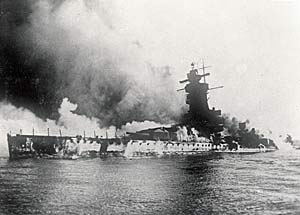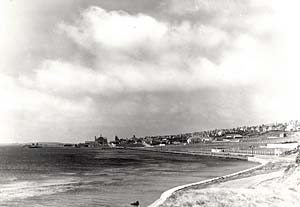
Exeter Stories
Exeter folk and friends in their own words - │ << Previous story │ Next story >> │
How I Went To the Falklands - Angela Margaret Sadleir
The following article dealing with the errand of mercy carried out by the small band of nurses from the British Hospital in Buenos Aires has been written by one of the brave women who did such wonderful work in the Falkland Islands. It does not deal with the part played by the nurses. True heroism and sacrifice does not need self-advertisement, but it is instead a tribute to those courageous sailors from the British warships who fought in the battle of Punta del Este; those who lost their lives and those whose wounds and sufferings were tended to by the ( a few words missing here)
Suddenly on a Friday afternoon the call came – Can you go to the Falklands to-morrow? I am sure 99 per cent of the sisters and nurses gave an affirmative answer.
So, on Saturday night, off we went – down the River Plate, carrying with us a wonderful example of the British Patriotic Association’s generosity; Doctors, nurses, masseuses, 270 packages containing equipment for a 100-bed hospital, a complete new X Ray manned by an expert radiologist. It would be far easier to name the things we did not take than those we did.
On our arrival at Montevideo we transhipped to the tiny SS Lafonia. How bravely her Red Duster floated in the breeze; then for the first time we realised how near we were to war. We saw the procession of wounded being carried ashore from the Graf Spee (How big she looked – how tiny we were ). Slowly, the day dragged on. President Ortiz – God Bless him – placed the Military Hospital in Bahia Blanca at the disposal of the battle-scarred Exeter. Then the question arose “Where is the Exeter?”. Hitler said, at the bottom of the sea, but the Embassy reported already she had passed too far along the coast to take advantage of (fragment missing)
At 17 o’clock we watched the Spee leave, full steam ahead for sea, her time having expired under international law; our hearts were heavy – still bravely on she went to meet the British tars outside. Suddenly the cry went up “She’s turned” Why, she is coming back – Yes, no, she goes ahead again – what tricks they are planning. Then came the most sickening boom, followed by another, the Radio working feverishly announced that the Graf Spee had blown up, but that all officers and men were safe.
So we slipped out of the harbour in complete darkness, passing the pocket battleship’s funeral pyre in silence, and we heard the B.B.C. announce that a hospital ship had left Montevideo for the Falklands.
Meanwhile, with the grim determination of the British, The Exeter with her sides pierced, her decks awash, entered into another battle – against time, her surgeons must have been superhuman. I can add nothing to this. However, our tiny craft followed at full speed. I wondered if she had the signal flags up – D. C. (we are coming to your assistance). Frankly, I never looked, as the temperature dropped and the deck became too cold for promenading. Argentina’s sunshine seemed far away, and already a vague memory.
When we entered Port Stanley we found the place in deepest mourning. The “Exeter” was their ship – the boys had danced with them, shared their homes and hearts, and now so many had passed on.
The day before Christmas proved a dull gray day, cold wind sweeping down, the sun making feeble attempts to break through, then finally giving up the attempt and retiring gracefully.
Hitler’s last victim had died. Slowly the Church bells tolled, the muffled roll of the drums, the sombre but beautiful music of the Marché Funéraille, the measured solemn tread of officers and men as they escorted their brother along the harbour front – then came the order “Quick March” and up the hill to the wee “God’s Acre” – each victim had passed along that route, as they had lived, and died, Magnificent. So there they sleep, facing the ships, the sea they loved so well – and HOME.
Christmas Day – For once the climate of the Falklands excelled itself, the sun worked overtime, (extract ends here)
Extract from an unknown newspaper (possibly Buenos Aires Herald), probably around 7th February 1940, of an article published anonymously, but known to be written by Angela Margaret Sadleir (1888-1970).
Angela Sadleir was born in Tasmania and went to Argentina along with two of her brothers. She served in France as a staff nurse with QAIMNSR from 1915. Her uncle, John Sadleir, served in the Victoria police for 44 years from 1852, and was in command of the final stages of the capture of Ned Kelly at Glenrowan, Victoria, in June 1880. She was a second cousin of Admiral of the Fleet David Beatty (1871-1936).
She died in Adelaide.This extract was prepared in 2002 by her grandnephew, Ronald Land, of Glasgow, who is Scottish but whose mother was Argentinean by birth and Australian/South African by descent.
 The Graf Spee burns after she was scuttled.
The Graf Spee burns after she was scuttled.  Port Stanley during 1939.
Port Stanley during 1939.
│ Top of Page │